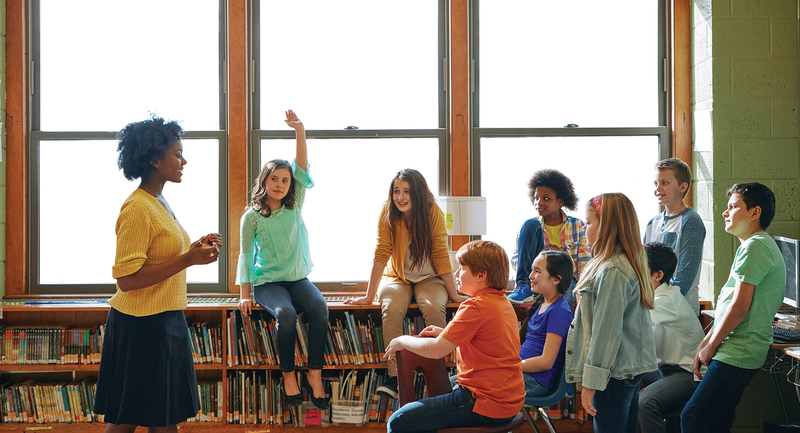Hollywood loves the teacher-as-savior trope—with those break-the-mold educators who stand and deliver in the classroom, winning the hearts and minds of stereotypically reluctant students with dynamic repartee that inspires them to believe in themselves, unleash their hidden talents, and, of course, carpe diem. As former teachers, we, too, once fancied we might engage our students in such deep discussions that we'd leave them calling "O Captain! my Captain!" (à la Dead Poets Society) as we left the room.
Yet as compelling as this teacher-as-savior narrative may be, research on classroom discussions suggests it's not just unrealistic, but also problematic. Beyond its troubling "white-savior" implications, it may also perpetuate some unhelpful myths about how—and among whom—deeper conversations should unfold in real-life classrooms.
The Power—and Limits—of Classroom Discussions
Here is what we know from research about what actual classroom conversations do for students.
Discussing learning with peers improves comprehension, but not necessarily deep learning. Studies show classroom discussions and peer-to-peer dialogue support better basic comprehension in reading (Applebee et al., 2003), mathematics (Cross, 2009), and science (Smith et al., 2009). Yet a meta-analysis of 42 studies that examined the use of classroom discourse to support literacy (Murphy et al., 2009) found that while talking about their learning helps students grasp concepts and understand texts, most discussions do little to spur students' critical thinking—be it analyzing writers' claims, evaluating the cogency or coherence of arguments, or developing and defending their own arguments. In fact, simply increasing students' talk time does little to increase their critical thinking, prompting researchers to conclude, "It is one thing to get students to talk to each other during … instruction but quite another to ensure that such engagement translates into significant learning" (p. 761).
Deep learning requires students to engage in critical-analytical discussions. For students to engage in deep learning, they must engage in a very specific kind of discussion—critical-analytical talk (Murphy et al., 2009), which includes considering open-ended, high-order questions and using multiple sources of information and evidence to support their responses (Murphy et al., 2018).
Students need direct instruction in critical-analytical thinking and discourse. A meta-analysis of 177 studies (Abrami et al., 2008) concluded that simply exposing students to rigorous learning does little to develop their critical thinking skills. Instead, they must be explicitly shown how to identify tacit and explicit assumptions, analyze and evaluate the logic of arguments, embrace open-mindedness, and seek to understand others, among other skills.
Takeaways for Teachers
So, what does all of this mean for classroom teachers? Here are some key takeaways:
Give students frequent opportunities to discuss learning. Students should regularly talk through, and make sense of, new learning with peers. Such discussions needn't be long; even 10-minute discussions support better basic comprehension (Fall, Webb, & Chudowsky, 1997). This serves as an important first step for deeper learning given that students cannot think critically about things they don't fully understand.
Support discussions in small groups. Research points to the power of small-group conversations (three or four students), which give individuals more opportunities to exchange ideas than do larger groups. Moreover, as Murphy and colleagues (2018) note, a key benefit of student discussions is the opportunity to engage in so-called collective reasoning (arriving at answers together)—something that's easier to accomplish in smaller groups.
Provide students with ground rules for discussions. Students must feel safe sharing ideas, being disagreed with, and disagreeing with others. Creating such conditions takes more than naming conversational norms; nonetheless, as a first step, it's important to develop (ideally, with students) ground rules for discussions (Murphy et al., 2018). These might include engaging in active listening, respectfully disagreeing with others, and building on others' comments (Applebee et al., 2003). Without such ground rules, case studies have shown that discussions can devolve into arguments that may be particularly disengaging for students who feel their experiences or views are ignored, disrespected, or not reflected in the dominant classroom culture (Bartell, 2013).
Invite students to ponder and respond to authentic questions. Case studies show that all too often teachers' questions during classroom discussions are "test" questions—queries designed to elicit "right" answers of basic knowledge (such as names of characters, plot elements, or settings) instead of authentic questions—open-ended prompts that invite students to think deeply and critically about their learning (Applebee, et al., 2003). Yes, it's good to check students' understanding of their learning. But the real power of classroom discourse comes from asking students questions that move beyond what they know to what they believe, doubt, or discount (Murphy et al., 2018).
Learn to let go. For many teachers, this is often the most difficult aspect of deeper discussions: ceding the floor of the classrooms to students and relinquishing their role as chief interpreter of texts or the final say in a discussion (Murphy et al., 2018). When teachers make this shift effectively and ask students authentic questions that encourage them to share their own ideas, they unleash the real power of classroom conversation (Murphy et al., 2018).
When it comes to classroom conversations, Hollywood tends to make teachers the stars of the show, motivational speakers whose pithy observations transform students' lives. As it turns out, though, the real stars of the discussion are students themselves, with true transformation occurring within, and emerging from, the ideas they share.








